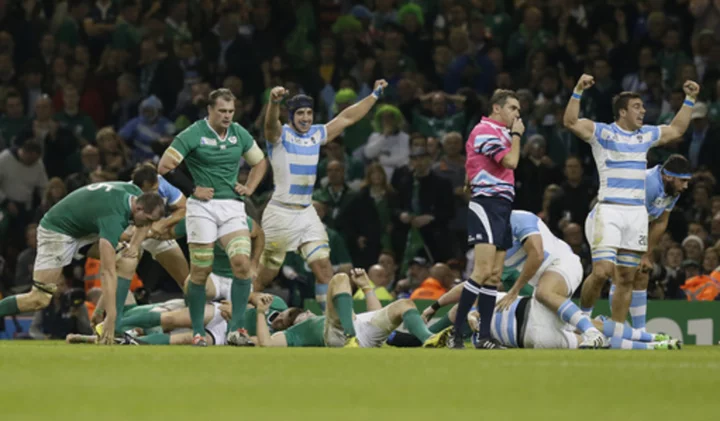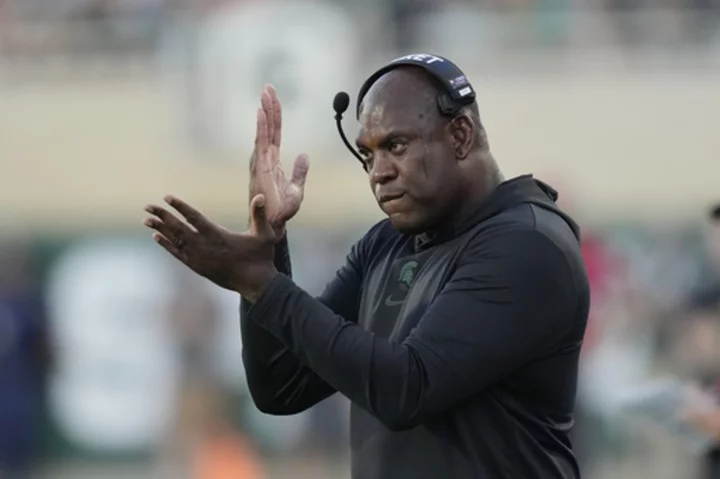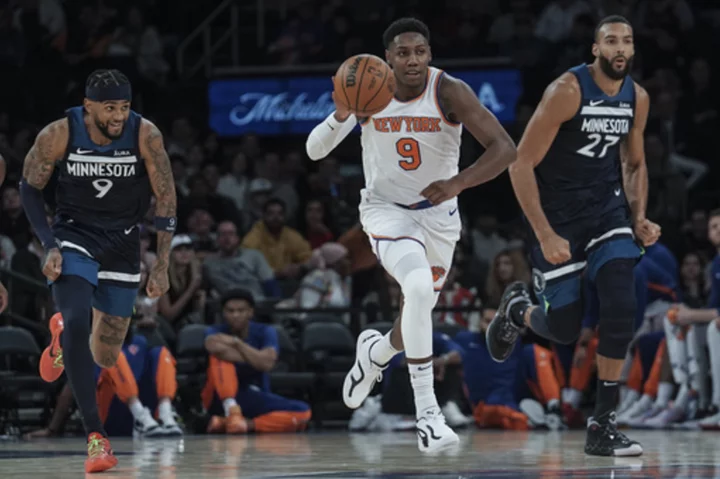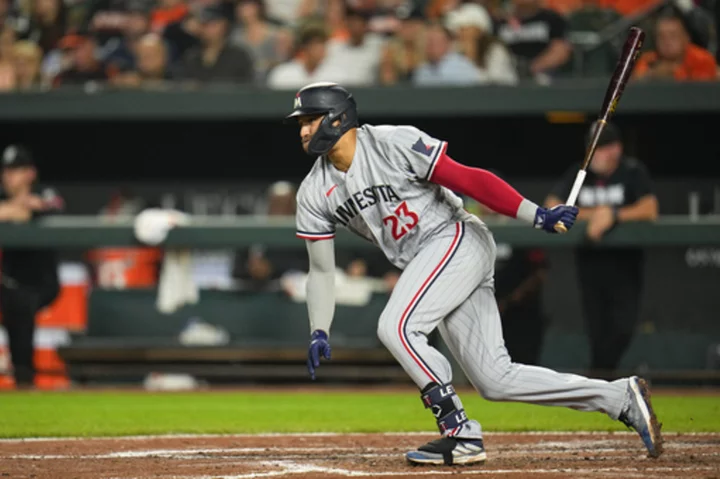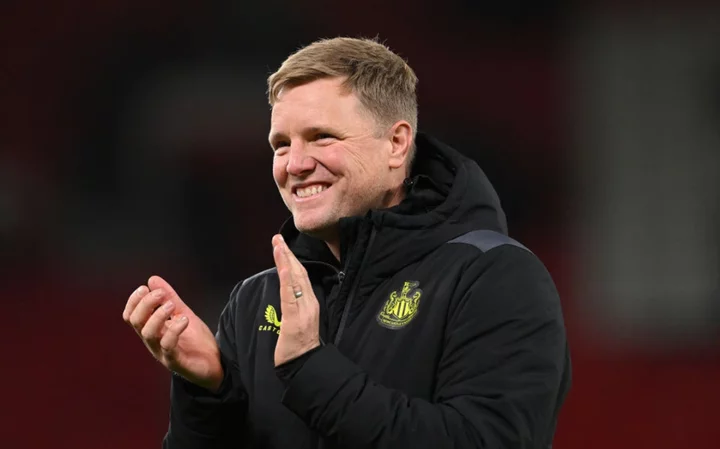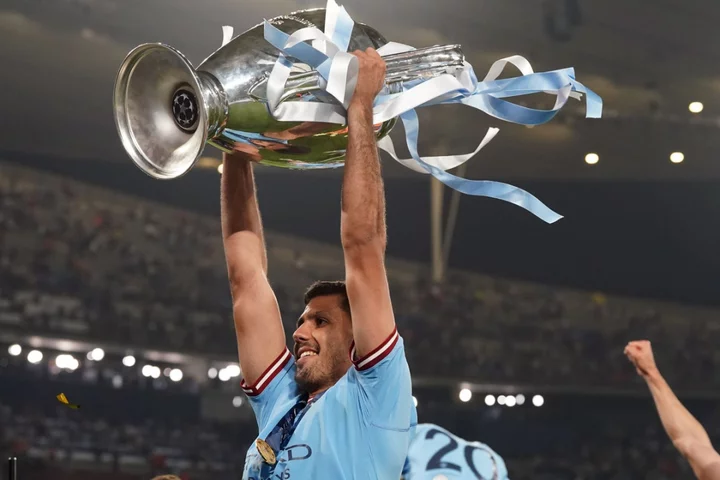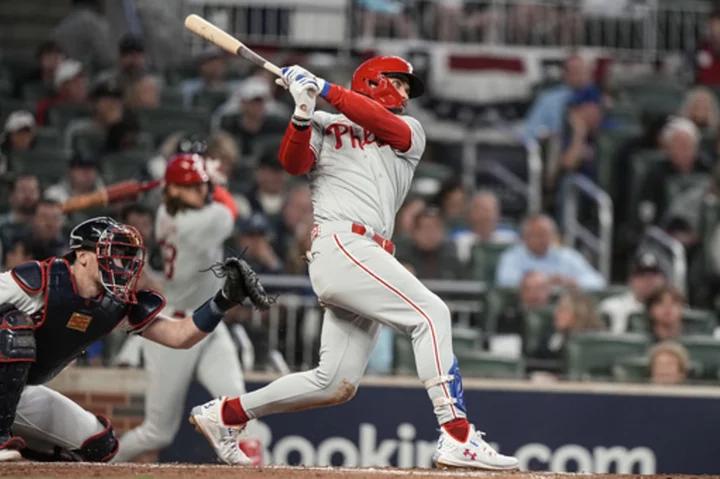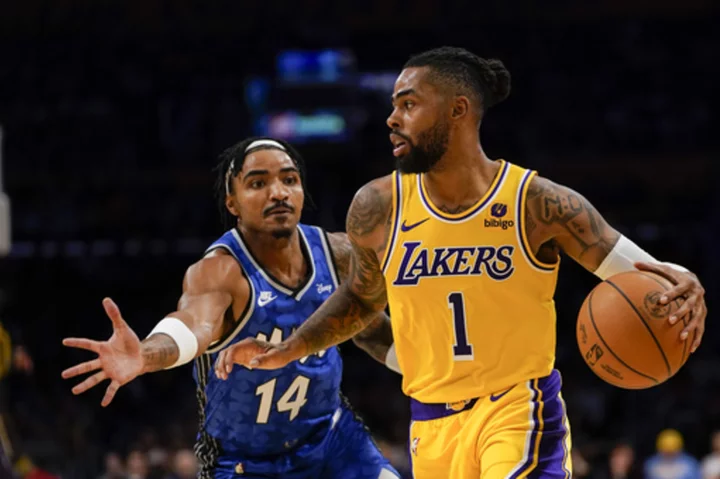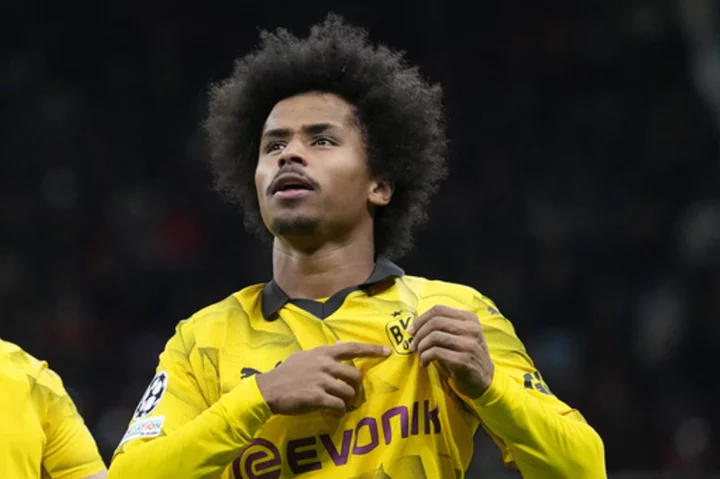Generations of Ireland's best players have never known what it's like to win a Rugby World Cup knockout match.
It is 36 years and counting that they have choked on the biggest stage.
In the nine World Cups, Ireland has reached the quarterfinals seven times and gone no further. No other team has suffered so many times. Even Scotland made the semifinals once.
The next adventure starts in Bordeaux on Sept. 9 against Romania.
Many predict the Irish to go all the way, such has been the magnitude of their success since the last World Cup in Japan. But, first, they have to get out of a pool including South Africa and Scotland then endure a week of questions about their historic inability to take another step.
Success is conditional, as one of Ireland's greatest, Paul O'Connell, explained in his biography about their goals for his fourth and last World Cup in 2015: “Success for us would be playing to our potential. I'd like to make the semifinal, and see what happens from there. Having said that, I'd be devastated if we made the semifinal and played poorly in it.”
Here is Ireland's tale of woe.
1987 L Australia 33-15 in Sydney
Irish bigwigs were some of the biggest opponents of the Rugby World Cup. Even when they realized they couldn't miss the inaugural party, their strict embrace of amateurism undermined the preparation of their own title-thinking team, the 1985 Five Nations champion and 1987 runner-up. Officials made none of the squad play club rugby in the seven weeks between the Five Nations and the World Cup and limited training. “Their logic was that they didn't want anyone to get injured,” center Michael Kiernan said. “I mean, the best way to get injured is probably not to play for two months and then go straight into a big World Cup game.” Two squad members dropped out after an IRA bomb blew up a car carrying a judge and his wife near a car driven by David Irwin with passengers Nigel Carr and Philip Rainey. The trio heading to training was lucky to live and only Irwin went to New Zealand. In the first week, coach Mick Doyle had a heart attack and was hospitalized but recovered in time for the first game, which decided the pool. Just 51 days after beating Wales 15-11 in Cardiff, Ireland lost to Wales 13-6 in extremely windy Wellington. After first use of the wind, Ireland turned only 6-0 up. It was never enough. Wales earned an extra day's rest before beating England in a Brisbane quarterfinal. Ireland had, four days after beating Tonga, to face Australia in their quarterfinal at Concord Oval. In the second minute, Phil Matthews' hip-first chargedown attempt slammed Nick Farr-Jones' head. Farr-Jones had to leave but Matthews wasn't sent off. Australia was aggrieved. After 26 minutes, Australia led 24-0. Kiernan said, “They murdered us to be honest. We were beaten out the gate that day.”
1991 L Australia 19-18 in Dublin
This loss hurts the most. The pool was decided at Murrayfield. Ireland led 15-9 in the 55th minute when fullback Jim Staples fielded a bomb but was tackled and unprotected when Scotland's Finlay Calder forearmed him in the head. Staples wasn't tested for concussion and wasn't the same under the high ball. Scotland won 24-15, advancing to a quarterfinal against Samoa. Ireland got Australia again. They hadn't met since 1987. But, again, the IRFU angered the team by not releasing payment from a sponsorship photoshoot until a players' boycott was threatened. Heavy underdog Ireland set the tone at Lansdowne Road in the first minute when Phil Matthews punched Willie Ofahengaue. With eight minutes to go, Ireland was hanging on to Australia to trail 15-12. From scrum ball in their own half, Staples chipped ahead, Jack Clarke beat David Campese to the pickup, and flanker Gordon Hamilton was in support to run 38 meters to the tryline. The noise was incredible. Ralph Keyes, who kicked five goals, converted and Ireland led 18-15. With fulltime close, Australia turned a throw-in into a five-meter scrum and Michael Lynagh was in support of Campese to make a great pickup and score for 19-18. Years later, Ireland prop Des Fitzgerald said, “It was just like you are about to sit down for dinner and someone whips your plate away. Losing the way we did annoyed me then. It still does to an extent.”
1995 L France 36-12 in Durban
Ireland was second to New Zealand in their pool thanks to a one-point win over Wales, its last win over a Five/Six Nations side at the World Cup for the next 20 years. Then Ireland lost the plot after three games in eight days. With six days to the quarterfinal against France, the Irish went for some R&R at the Sun City resort. They enjoyed it too much. France's Philippe Saint-Andre and Emile Ntamack matched the tries they scored in the Five Nations win and Thierry Lacroix kicked eight penalties to four by Eric Elwood. “They cut us apart,” captain Terry Kingston said. “France had (Olivier) Merle and (Olivier) Roumat and they destroyed us in the lineout. We hadn't practiced any short lineouts so we had no plan B. It was a major oversight.”
2003 L France 43-21 in Melbourne
Ireland was second to England in the Six Nations and second to Australia in their World Cup pool decider. Australia won 17-16 after leading 14-6 in Melbourne. Ireland could not pull in front. At 14-13, Elton Flatley hit a penalty followed by a Brian O'Driscoll dropped goal. Australia earned a quarterfinal against Scotland and Ireland had to play France in Melbourne. It wasn't a contest. France led 27-0 by halftime and 37-0 after 50 minutes. Ireland had a plan but France smashed it to pieces in the collisions. “They killed us. A couple of our fellas might have escaped with their lives but I wasn't one of them,” flyhalf Ronan O’Gara wrote in his biography. He was concussed by a tackle from Serge Betsen but convinced the medical team he was OK. He wasn't. He was replaced at 37-0 and said, “For one of the few times in my life I was glad to leave the field.” After the game, Ireland huddled on the field and captain Keith Wood told them it was his last test. Wood also had a special moment with France captain Fabien Galthie, who was retiring also when his World Cup ended. “I just said, ‘We have had good days together and bad days together,’” Wood said. “And he said, ‘It was either you or me retiring today.’”
2011 L Wales 22-10 in Wellington
From a middling Six Nations, Ireland went Down Under and swept a World Cup pool for the first time. Australia was beaten 15-6 at Eden Park, sending the Wallabies to face South Africa and Ireland against Wales in a Wellington quarterfinal that had echoes of ‘87. Ireland’s superior experience was picked to prevail, and the side's ambition made it spurn three kickable penalties in the first half. But by the break Wales led 10-3. Ireland drew level but errors allowed Wales to pull away with two tries. At fulltime, Irish players sunk to their knees in despair. “What really hurt was that it was there for us,” lock Paul O'Connell said. “We'd have been in the semifinal and the injuries were piling up for (eventual champion New Zealand). We'd have needed luck, but it wasn't beyond us — a chance to retire with brilliant feelings of achievement that would have stood us for the rest of our lives.” When they arrived home, there were a few hundred people at the airport to console them. It made captain Brian O'Driscoll uncomfortable. This World Cup was his greatest disappointment. “We failed. Beating Australia and then losing in a quarterfinal — like other Ireland teams before us — is nothing to be proud of.”
2015 L Argentina 43-20 in Cardiff
Ireland won the Six Nations in 2014 and 2015. Confidence was high. Expectation was higher. As it did in 2011, Ireland whitewashed its pool. In the four games, the Irish let through only two tries. But that roll extracted a high cost. Center Jared Payne broke his foot. Beating France 24-9 in the pool finale in Cardiff was bittersweet. Jonathan Sexton hobbled off with a groin strain and captain Paul O'Connell was carried off with a torn hamstring in the first half. Then Peter O'Mahony went down after the break with a knee ligament injury. After the game, Sean O'Brien was suspended from the quarterfinal for punching Pascal Pape. If there were five players Ireland didn't want to lose, those were the five. Team leaders and current or future Lions. “All of us were big into driving the team in terms of line speed, and we didn't have enough of it on the day,” O'Connell said. “Argentina played out of their skins.” Ireland hadn't lost to the Pumas since 2007 but was spooked by an opening blitz. After just 12 minutes, Tommy Bowe was carried off injured and Argentina led 17-0. Ireland clawed back to trail 20-17 and 23-20 but the last half-hour was all Pumas. Bowe said, “All those games — Romania, France, Italy and Canada — were all to get us to the top of the group and to try get us through to a semifinal, something that had never been done by an Irish side before. We didn't do it and, in a way, we did everything for nothing, which is very, very frustrating.”
2019 L New Zealand 46-14 in Tokyo
Ireland came to the first World Cup in Asia rated No. 1 in the world after successive warmup wins over recent No. 1 Wales. The ranking was lost and title ambitions upended in a shock first loss to tournament host Japan, a 9-1 underdog. The 19-12 defeat ultimately decided the pool. First-placed Japan went on to face South Africa in the quarterfinals, and second-placed Ireland was lumped with defending champion New Zealand. The Irish, coached by New Zealander Joe Schmidt, beat New Zealand for the first and second time in their history since the last World Cup. Both sides were relishing their biggest matchup yet at Tokyo Stadium. Irish players couldn't hear the haka from 20 meters away, so loud was “Fields of Athenry” sung by their supporters. “The last thing Bestie (captain Rory Best) said to us in the huddle was to look around, to listen up, to hear that sound because this was it, this was our night,” fullback Rob Kearney said. Then the All Blacks scored seven tries. Ireland didn't score until the 69th minute. Ireland suffered its heaviest World Cup defeat. “We're incredibly disappointed, we had a lot of big characters in that team,” the retiring Best said. “Big men were in tears in that dressing room and that's what happens when you put your heart and soul into everything.”
Ireland has more big characters ready to go in France after its best preparation yet for a Rugby World Cup. Lessons have been heeded and more wins accumulated than ever. But Ireland knows there are no guarantees. If it advances from its pool again, waiting in the quarterfinals are likely to be familiar barriers: Either tournament host France or New Zealand.
___
AP rugby: https://apnews.com/hub/rugby

